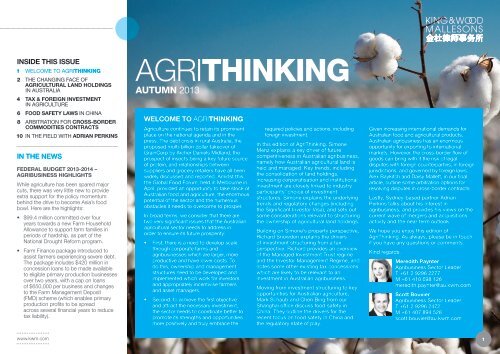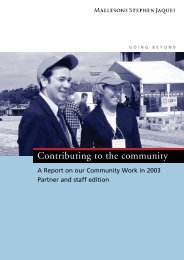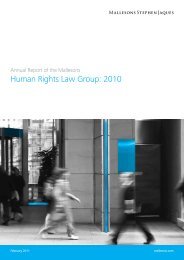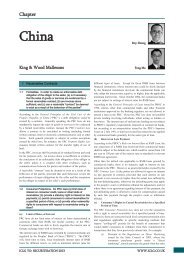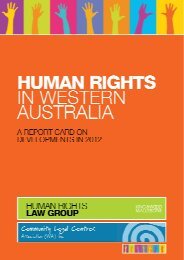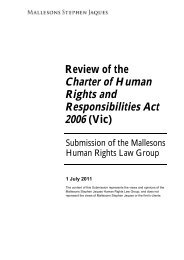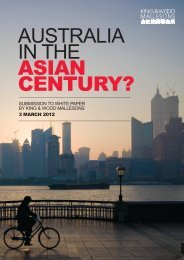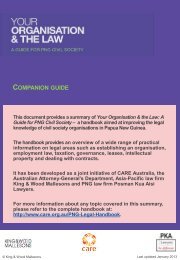AgriThinking - Autumn 2013 - Mallesons
AgriThinking - Autumn 2013 - Mallesons
AgriThinking - Autumn 2013 - Mallesons
Create successful ePaper yourself
Turn your PDF publications into a flip-book with our unique Google optimized e-Paper software.
INSIDE THIS ISSUE<br />
1 WELCOME TO AGRITHINKING<br />
2 THE CHANGING FACE OF<br />
AGRICULTURAL LAND HOLDINGS<br />
IN AUSTRALIA<br />
4 TAX & FOREIGN INVESTMENT<br />
IN AGRICULTURE<br />
6 FOOD SAFETY LAWS IN CHINA<br />
8 ARBITRATION FOR CROSS-BORDER<br />
COMMODITIES CONTRACTS<br />
10 IN THE FIELD WITH ADRIAN PERKINS<br />
IN THE NEWS<br />
FEDERAL BUDGET <strong>2013</strong>-2014 –<br />
AGRIBUSINESS HIGHLIGHTS<br />
While agriculture has been spared major<br />
cuts, there was very little new to provide<br />
extra support for the policy momentum<br />
behind the drive to become Asia’s food<br />
bowl. Here are the highlights:<br />
• $99.4 million committed over four<br />
years towards a new Farm Household<br />
Allowance to support farm families in<br />
periods of hardship, as part of the<br />
National Drought Reform program.<br />
• Farm Finance package introduced to<br />
assist farmers experiencing severe debt.<br />
The package includes $420 million in<br />
concession loans to be made available<br />
to eligible primary production businesses<br />
over two years, with a cap on loans<br />
of $650,000 per business and changes<br />
to the Farm Management Deposit<br />
(FMD) scheme (which enables primary<br />
production profits to be spread<br />
across several financial years to reduce<br />
tax liability).<br />
AGRITHINKING<br />
AUTUMN <strong>2013</strong><br />
WELCOME TO AGRITHINKING<br />
Agriculture continues to retain its prominent<br />
place on the national agenda and in the<br />
press. The debt crisis in rural Australia, the<br />
proposed multi-billion dollar takeover of<br />
GrainCorp by Archer Daniels Midland, the<br />
prospect of insects being a key future source<br />
of protein, and relationships between<br />
suppliers and grocery retailers have all been<br />
widely discussed and reported. Amidst this,<br />
the Global Food Forum, held in Melbourne in<br />
April, provided an opportunity to take stock of<br />
Australian food and agriculture, the enormous<br />
potential of the sector and the numerous<br />
obstacles it needs to overcome to prosper.<br />
In broad terms, we consider that there are<br />
two very significant issues that the Australian<br />
agricultural sector needs to address in<br />
order to ensure its future prosperity:<br />
• First, there is a need to develop scale<br />
through corporate farms and<br />
agribusinesses which are larger, more<br />
productive and have lower costs. To<br />
do this, ownership and management<br />
structures need to be developed and<br />
implemented which work for investors<br />
and appropriately incentivise farmers<br />
and asset managers.<br />
• Second, to achieve the first objective<br />
and attract the necessary investment,<br />
the sector needs to coordinate better to<br />
promote its strengths and opportunities<br />
more positively and truly embrace the<br />
required policies and actions, including<br />
foreign investment.<br />
In this edition of <strong>AgriThinking</strong>, Simone<br />
Menz explains a key driver of future<br />
competitiveness in Australian agribusiness,<br />
namely how Australian agricultural land is<br />
held and managed. Key trends, including<br />
the consolidation of land holdings,<br />
increasing corporatisation and institutional<br />
investment are closely linked to industry<br />
participants’ choice of investment<br />
structures. Simone explains the underlying<br />
trends and regulatory changes (including<br />
the Significant Investor Visa), and sets out<br />
some considerations relevant to structuring<br />
the ownership of agricultural land holdings.<br />
Building on Simone’s property perspective,<br />
Richard Snowden explains the drivers<br />
of investment structuring from a tax<br />
perspective. Richard provides an overview<br />
of the Managed Investment Trust regime<br />
and the Investor Management Regime, and<br />
notes some other existing tax concessions<br />
which are likely to be relevant to an<br />
investment in Australian agribusiness.<br />
Moving from investment structuring to key<br />
opportunities for Australian agriculture,<br />
Mark Schaub and Chen Bing from our<br />
Shanghai office discuss food safety in<br />
China. They outline the drivers for the<br />
recent focus on food safety in China and<br />
the regulatory state of play.<br />
Given increasing international demands for<br />
Australian food and agricultural products,<br />
Australian agribusiness has an enormous<br />
opportunity for exporting to international<br />
markets. However, the cross-border flow of<br />
goods can bring with it the risk of legal<br />
disputes with foreign counterparties, in foreign<br />
jurisdictions, and governed by foreign laws.<br />
Alex Baykitch and Daisy Mallett, in our final<br />
article, outline some arbitration options for<br />
resolving disputes in cross-border contracts.<br />
Lastly, Sydney-based partner Adrian<br />
Perkins talks about his interest in<br />
agribusiness, and provides his views on the<br />
current wave of mergers and acquisitions<br />
activity and the near term outlook.<br />
We hope you enjoy this edition of<br />
<strong>AgriThinking</strong>. As always, please be in touch<br />
if you have any questions or comments.<br />
Kind regards,<br />
Meredith Paynter<br />
Agribusiness Sector Leader<br />
T +61 2 9296 2277<br />
M +61 418 698 126<br />
meredith.paynter@au.kwm.com<br />
Scott Bouvier<br />
Agribusiness Sector Leader<br />
T +61 2 9296 2472<br />
M +61 407 894 528<br />
scott.bouvier@au.kwm.com<br />
www.kwm.com<br />
1
INSIDE THIS ISSUE<br />
1 WELCOME TO AGRITHINKING<br />
2 THE CHANGING FACE OF<br />
AGRICULTURAL LAND HOLDINGS<br />
IN AUSTRALIA<br />
4 TAX & FOREIGN INVESTMENT<br />
IN AGRICULTURE<br />
6 FOOD SAFETY LAWS IN CHINA<br />
8 ARBITRATION FOR CROSS-BORDER<br />
COMMODITIES CONTRACTS<br />
10 IN THE FIELD WITH ADRIAN PERKINS<br />
IN THE NEWS<br />
FEDERAL BUDGET <strong>2013</strong>-2014 –<br />
AGRIBUSINESS HIGHLIGHTS (CONT)<br />
• Funding of $38.5 million over four years<br />
to support environmental assessment<br />
and approval processes of projects,<br />
and to provide greater environmental<br />
protection for water resources from<br />
any adverse impacts of coal seam gas<br />
and large coal mining developments.<br />
• Certain agricultural production levies<br />
and export charges have been either<br />
changed or introduced to better fund<br />
R&D and industry membership of Plant<br />
Health Australia (PHA), which helps<br />
protect Australia’s biosecurity system.<br />
PHA levies have been introduced for<br />
chestnuts, fresh olives and sales of<br />
potted plants. R&D levies have been<br />
introduced for processing olives, and<br />
reduced for potted plants and chestnuts.<br />
AGRITHINKING<br />
AUTUMN <strong>2013</strong><br />
THE CHANGING FACE OF AGRICULTURAL LAND HOLDINGS IN AUSTRALIA<br />
Agricultural land in Australia has historically<br />
been held by families, either directly or<br />
within a family trust, and a handful of<br />
pastoral companies. Leaving aside timber<br />
schemes, institutional investors have not<br />
been prominent in Australian agricultural<br />
or primary industry land holdings to date.<br />
Change is imminent, as the purchasers of<br />
agricultural land holdings today are more<br />
likely than ever before to be institutional<br />
and/or offshore investors with larger<br />
holdings. This has consequences for<br />
the nature of land holdings and farming<br />
operations in Australia.<br />
Why is this change occurring<br />
There are a number of reasons. A two-tier<br />
market has been established by the lending<br />
practices of Australian banks; lending<br />
criteria has tightened for lending to<br />
individuals or families for the purchase<br />
or operation of a single farm. Generational<br />
change in farming families also means that<br />
it is no longer assumed that the farm will<br />
remain in the family for future generations.<br />
There is a trend towards homogenization<br />
of fresh produce in supermarkets, which<br />
can only be met by having farming<br />
operations of a significant scale, and it is<br />
more efficient for major supermarkets to<br />
deal with fewer suppliers who can supply<br />
larger quantities of fresh produce. Food<br />
security and supply issues are also a factor,<br />
having particular relevance to Asian and<br />
Middle East investors, and they throw a very<br />
different investment driver into the mix.<br />
To protect the food supply chain, investors<br />
sometimes acquire other assets within<br />
the supply chain – for example, logistics<br />
and processing facilities. The ancillary<br />
investment into those other assets requires<br />
significant capital.<br />
The introduction of the Significant Investor<br />
Visa (or “SIV”) may facilitate further<br />
investment through fund structures as high<br />
net worth individuals, especially from Asia,<br />
seek to access this recently introduced<br />
immigration pathway into Australia. The SIV,<br />
once granted, allows the individual and their<br />
family to reside in Australia under a 4 year<br />
provisional visa, which can be extended for<br />
up to a further 4 years and then converted to<br />
a permanent visa. Importantly, an innovation<br />
points test, upper age limits and English<br />
language threshold requirements do not<br />
apply, and so the SIV is more flexible than<br />
other types of business or investment visas.<br />
The SIV requires investment by the<br />
individual of at least A$5m through an<br />
ASIC-regulated fund which holds certain<br />
types of assets, which can include<br />
agricultural real estate assets.<br />
The SIV has already attracted a lot of<br />
interest from high net worth individuals in<br />
China in particular, and it seems that<br />
immigration entitlements coupled with<br />
investment in the Australian agribusiness<br />
sector could be a powerful combination.<br />
Colliers International has observed<br />
a number of foreign investment trends<br />
in agribusiness recently, particularly in<br />
the wine industry. According to Angus<br />
Barrington-Case, Director of Rural<br />
and Agribusiness Valuation at Colliers<br />
International, “The link to Asian distribution<br />
networks gives an advantage to the offshore<br />
investor that Australian investors may not<br />
be able to capture. There have been<br />
a number of wine industry sales throughout<br />
Australia’s premium wine growing regions,<br />
typically within a two hour commute of<br />
Australian capital cities, that have occurred<br />
at rates a step ahead of the general market.<br />
These transactions demonstrate that in<br />
a number of instances, offshore investors<br />
have had a more positive view on the<br />
market than locals, or alternatively, greater<br />
access to funds to purchase the properties<br />
or better access to distribution networks.”<br />
Consequences of the change<br />
The nature of agricultural operations means<br />
they can be significantly impacted on<br />
a seasonal basis by factors such as<br />
weather, natural disasters and fluctuations<br />
in commodity prices.<br />
The resulting risks to cashflow are sometimes<br />
inconsistent with the investment criteria of<br />
www.kwm.com<br />
2
INSIDE THIS ISSUE<br />
1 WELCOME TO AGRITHINKING<br />
2 THE CHANGING FACE OF<br />
AGRICULTURAL LAND HOLDINGS<br />
IN AUSTRALIA<br />
4 TAX & FOREIGN INVESTMENT<br />
IN AGRICULTURE<br />
6 FOOD SAFETY LAWS IN CHINA<br />
8 ARBITRATION FOR CROSS-BORDER<br />
COMMODITIES CONTRACTS<br />
10 IN THE FIELD WITH ADRIAN PERKINS<br />
IN THE NEWS<br />
FEDERAL BUDGET <strong>2013</strong>-2014 –<br />
AGRIBUSINESS HIGHLIGHTS (CONT)<br />
• $25.4 million over five years to develop<br />
a pilot National Produce Monitoring<br />
program to identify risks associated with<br />
the use of agricultural chemicals and<br />
veterinary medicines that are currently<br />
not being assessed, particularly to the<br />
extent that they are used in relation to<br />
food sold for consumption.<br />
• Food Innovation Precinct funding<br />
confirmed – up to $4 million of funding<br />
per annum for 5 years.<br />
AGRITHINKING<br />
AUTUMN <strong>2013</strong><br />
institutional investors. For this reason, it is<br />
becoming increasingly common for the<br />
acquisition of agricultural land holdings to be<br />
subject to a leaseback, so that the vendor<br />
pays a rental to the new owner of the land<br />
and continues to carry on the farming<br />
operations as a tenant of the land. The<br />
vendor (now a tenant) retains a level of risk<br />
and reward from the success or otherwise of<br />
those farming operations, and the new owner<br />
(now a landlord) has the benefit of a relatively<br />
consistent income stream that can be<br />
distributed regularly to investors.<br />
In recent times, there has been a trend<br />
towards sale and leaseback arrangements.<br />
Barrington-Case says “These transactions<br />
have typically occurred within the capital<br />
intensive sectors, such as horticulture and<br />
irrigated agriculture. There are also<br />
examples within the forestry and broad<br />
hectare sectors, however they are less<br />
common. In most instances, investors are<br />
looking for returns of between 8% and<br />
10% of total funds invested, which generally<br />
limits this kind of capital injection to<br />
vertically integrated businesses which<br />
can value-add the agricultural commodity<br />
or access global markets.”<br />
Therefore, for the right sector and asset, the<br />
benefits to the vendor are clear. Barrington-<br />
Case says “Given the current low returns<br />
within the Australian agricultural sector,<br />
many farm operators are highly leveraged.<br />
A sale and leaseback provides a capital<br />
injection to the business to ensure a viable<br />
operating future and retention of good farm<br />
management.” However, he warns that<br />
these transactions need to be assessed on<br />
a case by case basis, as they will not always<br />
provide the best outcome for either party.<br />
A sale and leaseback arrangement can<br />
also take advantage of the “flow-through”<br />
taxation status of trusts, so that income is<br />
taxed in the hands of the investors, applying<br />
any concessional rates and discounts<br />
available to those investors.<br />
There are a number of commercial and<br />
taxation matters to be worked through<br />
under a sale and leaseback arrangement<br />
involving an institutional investor as<br />
landlord, such as:<br />
• an appropriate allocation of risk and<br />
reward from the farming operations,<br />
which might be reflected in the<br />
rental structure;<br />
• ensuring that the income to the<br />
landlord can be properly characterized<br />
as rent, so that the Australian trading<br />
trust provisions are not triggered;<br />
• the extent to which produce from the<br />
farming operations is sold or processed<br />
through the marketing and supply<br />
chains of the landlord, to take advantage<br />
of the landlord’s scale of operations;<br />
• the extent to which the landlord is<br />
entitled to visibility and/or control over<br />
the farming operations, particularly<br />
towards the end of the lease;<br />
• ensuring that the landlord has<br />
appropriate rights in relation to material<br />
operational licences and permits,<br />
particularly water entitlements, so that<br />
the landlord ends up with a saleable or<br />
leaseable asset at the end of the lease;<br />
• retaining flexibility at the ownership<br />
level for new investors, and for<br />
existing investors to exit, ideally in<br />
a tax-efficient manner; and<br />
• achieving the right stamp duty and<br />
GST treatment for the arrangement.<br />
The structural changes in farm ownership<br />
are likely to contribute towards<br />
consolidation of agricultural land holdings<br />
in Australia. Ultimately, if this consolidation<br />
continues to occur, it should put the<br />
Australian industry in a more globally<br />
competitive position and allow food<br />
producers to focus on issues such as<br />
sustainable farming practices, resource<br />
management and productivity gains.<br />
Simone Menz<br />
Partner, Real Estate<br />
T +61 3 9643 4219<br />
M +61 412 603 499<br />
simone.menz@au.kwm.com<br />
www.kwm.com<br />
3
INSIDE THIS ISSUE<br />
1 WELCOME TO AGRITHINKING<br />
2 THE CHANGING FACE OF<br />
AGRICULTURAL LAND HOLDINGS<br />
IN AUSTRALIA<br />
4 TAX & FOREIGN INVESTMENT<br />
IN AGRICULTURE<br />
6 FOOD SAFETY LAWS IN CHINA<br />
8 ARBITRATION FOR CROSS-BORDER<br />
COMMODITIES CONTRACTS<br />
10 IN THE FIELD WITH ADRIAN PERKINS<br />
IN THE NEWS<br />
NATIONAL FOOD PLAN WHITE<br />
PAPER RELEASED<br />
Senator the Hon Joe Ludwig, Minister for<br />
Agriculture, Fisheries and Forestry, released<br />
the long-awaited National Food Plan White<br />
Paper on 25 May <strong>2013</strong>. The White Paper<br />
outlined 16 goals and a number of new,<br />
supporting initiatives, including:<br />
• $28 million for a grants program for<br />
research into Asian markets;<br />
• A “What Asia Wants” study to identify<br />
food needs and preferences in the<br />
region and identify long-term risks<br />
and opportunities for the Australian<br />
food industry; and<br />
• A Productivity Commission review<br />
to identify priority areas for reforming<br />
food supply chain regulations.<br />
Read the announcement here.<br />
AGRITHINKING<br />
AUTUMN <strong>2013</strong><br />
TAX & FOREIGN INVESTMENT IN AGRICULTURE<br />
Over recent years, various tax regimes have<br />
been introduced to encourage foreign<br />
investment in Australia and they have been<br />
used to invest in the agricultural sector.<br />
These include:<br />
• the Managed Investment Trust (“MIT”)<br />
regime; and<br />
• the Investment Manager Regime<br />
(“IMR”) (including the recent release<br />
of draft legislation in relation to the<br />
third (final) element).<br />
These new regimes, together with other<br />
existing tax concessions available to<br />
taxpayers engaged in a primary production<br />
business, should assist to provide a more<br />
favourable tax environment for foreign<br />
investment in Australian agricultural assets.<br />
This article provides a brief overview of<br />
the MIT regime and IMR and notes some<br />
other existing tax concessions which are<br />
likely to be relevant to any investment in<br />
Australian agribusiness.<br />
Managed Investment Trust (MIT) regime<br />
We have seen an increasing number of<br />
foreign investors use trust structures for<br />
their investments in Australian agricultural<br />
assets. Many of these structures involve<br />
the establishment of an Australian MIT<br />
often in combination with a stapled share<br />
in an operating company.<br />
One of the key benefits of using a MIT is the<br />
reduced rate of withholding tax (generally<br />
15%, although in certain limited cases<br />
for “clean building” MITs, the rate can be<br />
reduced to 10%) that is applied to certain<br />
distributions that are made to qualifying<br />
foreign residents. Examples include<br />
distributions of rental income from an<br />
investment in Australian agricultural land<br />
and distributions of capital gains which may<br />
be realised when underlying assets are sold.<br />
Another key benefit is the ability for the<br />
MIT to make a capital account election in<br />
relation to certain investments such as<br />
shares, units, real property or rights or<br />
options to acquire one of those assets.<br />
This is intended to remove uncertainty<br />
surrounding the tax treatment of such<br />
investments and preserve the capital<br />
gains tax exemption for foreign investors<br />
in relation to gains realised on those<br />
investments which are not taxable<br />
Australian property.<br />
Broadly, the key requirements which must<br />
be satisfied in order for a trust to be a MIT<br />
and be eligible for the reduced withholding<br />
tax rate include the following:<br />
• the trustee of the MIT must be an<br />
Australian resident, or management and<br />
control of the trust must be in Australia;<br />
• the MIT must not be a “trading trust”<br />
(i.e. it must not control an active<br />
business);<br />
• a substantial portion of investment<br />
management activities carried out in<br />
relation to the trust in respect of<br />
“Australian assets” must be in Australia;<br />
• the trust must be a “managed<br />
investment scheme” (“MIS”);<br />
• the trust must have a wholesale<br />
membership or be a registered MIS;<br />
• the trust must satisfy certain widely held<br />
requirements (generally 25 members,<br />
although deeming rules are available);<br />
• the trust must not be “closely held”<br />
(e.g. a foreign individual must not<br />
hold 10% or more); and<br />
• the trust must satisfy certain<br />
licensing requirements.<br />
For a trust to be a MIT and have the ability<br />
to make the capital account election, it must<br />
meet similar requirements to those listed<br />
above, with some exceptions. For example,<br />
in certain circumstances (e.g. where the<br />
only member of a trust is another MIT),<br />
a trust may be deemed to have satisfied<br />
some of the above requirements.<br />
www.kwm.com<br />
4
INSIDE THIS ISSUE<br />
1 WELCOME TO AGRITHINKING<br />
2 THE CHANGING FACE OF<br />
AGRICULTURAL LAND HOLDINGS<br />
IN AUSTRALIA<br />
4 TAX & FOREIGN INVESTMENT<br />
IN AGRICULTURE<br />
6 FOOD SAFETY LAWS IN CHINA<br />
8 ARBITRATION FOR CROSS-BORDER<br />
COMMODITIES CONTRACTS<br />
10 IN THE FIELD WITH ADRIAN PERKINS<br />
IN THE NEWS<br />
INCREASED MARKET ACCESS FOR<br />
AUSTRALIAN AGRICULTURE IN CHINA<br />
The Chinese Minister for Agriculture, Han<br />
Changfu and his Australian counterpart,<br />
Senator the Hon Joe Ludwig, have signed<br />
an agriculture agreement to expand<br />
co-operation in science, investment and<br />
trade. China also accredited 28 Australian<br />
cold store facilities and four red meat<br />
plants, which will facilitate continued<br />
growth in Australian beef exports to China.<br />
Read the announcement here.<br />
GRAINCORP PROVISIONALLY<br />
ACCEPTS BID FROM ARCHER<br />
DANIELS MIDLAND<br />
GrainCorp provisionally accepted an<br />
improved $3bn takeover bid by<br />
multinational grain giant Archer Daniels<br />
Midland (ADM). ADM has completed<br />
confirmatory due diligence and will make<br />
a formal takeover bid.<br />
AGRITHINKING<br />
AUTUMN <strong>2013</strong><br />
For the purpose of making agricultural<br />
investments, a dual structure is often used<br />
– with the MIT holding the agricultural land<br />
holdings and a corporate entity conducting<br />
the business. In such a case, the corporate<br />
entity pays tax at the company tax rate<br />
(30%) on profits. This structure can also<br />
protect the land holding from claims relating<br />
to the conduct of the business.<br />
Investment Manager Regime (IMR)<br />
The recent release of draft legislation in<br />
relation to the third (final) element of the IMR<br />
should also be welcome news for foreign<br />
investors making investments in Australian<br />
agricultural assets.<br />
Generally, where a foreign fund meets the<br />
definition of an “IMR foreign fund”,<br />
Australian sourced capital gains and<br />
revenue gains made by the foreign fund in<br />
respect of passive portfolio investments<br />
(with the exception of certain real property<br />
interests) will be exempt from Australian tax.<br />
However, the changes do not affect income<br />
from dividends, interest and royalties that<br />
is subject to withholding tax.<br />
To be an “IMR foreign fund”, a foreign<br />
fund must:<br />
• not be an Australian resident at any time<br />
during the income year;<br />
• not conduct or control a trading<br />
business in Australia at any time during<br />
the income year (i.e. a trading business<br />
outside Australia is acceptable);<br />
• be resident in an information<br />
exchange country at all times during<br />
the income year;<br />
• pass a “widely held” and “closely held”<br />
test; and<br />
• give an annual information statement<br />
to the Commissioner each year and<br />
make available certain information to<br />
beneficiaries and members.<br />
Special rules also ensure that the IMR<br />
exemption only flows to foreign resident<br />
beneficiaries and partners where the<br />
IMR foreign fund is a trust or partnership.<br />
The benefit of utilising an IMR arrangement<br />
would be to allow management of the foreign<br />
fund’s Australian assets, without jeopardising<br />
the tax status of the foreign fund.<br />
Other tax concessions<br />
As noted above, there are already existing<br />
tax concessions that may be available to<br />
a taxpayer engaged in a primary production<br />
business. Some of these include:<br />
• annual deductions over 10 years for<br />
the cost of communication lines;<br />
• three year write-off for expenditure<br />
on water facilities;<br />
• outright deductions for<br />
landcare operations;<br />
• spreading of insurance recoveries<br />
for livestock; and<br />
• spreading or deferring the tax profit<br />
due to the forced disposal or<br />
compulsory destruction of livestock.<br />
These deductions can be significant,<br />
particularly for large agricultural operations.<br />
Richard Snowden<br />
Partner<br />
T +61 2 9296 2193<br />
M +61 413 943 370<br />
richard.snowden@au.kwm.com<br />
www.kwm.com<br />
5
INSIDE THIS ISSUE<br />
1 WELCOME TO AGRITHINKING<br />
2 THE CHANGING FACE OF<br />
AGRICULTURAL LAND HOLDINGS<br />
IN AUSTRALIA<br />
4 TAX & FOREIGN INVESTMENT<br />
IN AGRICULTURE<br />
6 FOOD SAFETY LAWS IN CHINA<br />
8 ARBITRATION FOR CROSS-BORDER<br />
COMMODITIES CONTRACTS<br />
10 IN THE FIELD WITH ADRIAN PERKINS<br />
IN THE NEWS<br />
GLENCORE TO SELL OFF<br />
MALT ASSETS<br />
Glencore has signalled plans to sell off its<br />
Australian malting assets which were<br />
acquired as part of the $6.1 billion takeover<br />
of Viterra in December 2012.<br />
COLES – MURRAY GOULBURN<br />
SUPPLY ARRANGEMENT<br />
Coles has announced that it will directly<br />
source $2.6 billion of milk from Murray<br />
Goulburn over 10 years from July 2014.<br />
As a result of the agreement, Devondale<br />
(Murray Goulburn Co-operative) will make<br />
the biggest milk processing investment<br />
since the dairy industry deregulated in 2000<br />
– two facilities in Melbourne and Sydney<br />
worth $120 million to supply Coles’ private<br />
label brands in Victoria and NSW.<br />
AGRITHINKING<br />
AUTUMN <strong>2013</strong><br />
FOOD SAFETY LAWS IN CHINA<br />
It would be safe to say that when Hong<br />
Kong rejoined China as a Special<br />
Administrative Region in 1997 there was<br />
little thought, if any, paid to milk powder<br />
and its effect on relations with the mainland.<br />
However, recent restrictions introduced in<br />
Hong Kong on the sale and distribution of<br />
milk powder produced by mainland China<br />
suppliers has become a major, and indeed<br />
emotional, issue. When the 12 th Chinese<br />
People’s Political Consultative Conference<br />
National Committee (“CPPCC”) and 12 th<br />
National People’s Congress (“NPC”) (the<br />
highest authority of the PRC) commenced<br />
on March 5, <strong>2013</strong>, baby milk grabbed the<br />
attention of representatives in both forums.<br />
When Australian food businesses think<br />
China they often think “food security” and<br />
the Chinese Government’s concern to<br />
ensure adequate food supplies. However,<br />
the Chinese consumer’s concern with “food<br />
safety” may be the far greater selling point.<br />
As a consequence of a spate of high profile<br />
safety scares affecting staples in the local<br />
diet, food safety is now very much a part of<br />
the public agenda in China. Even if this level<br />
of overt heightened awareness recedes,<br />
strong public sentiment will remain just<br />
beneath the surface, awaiting the next<br />
scandal. Food safety scandals have<br />
surfaced in China long before the recent<br />
milk powder concerns and include substandard<br />
baby milk produced in Anhui,<br />
Longkou noodles containing lead from<br />
Shandong, fake alcohol in Guangdong,<br />
eggs with melamine and even soy sauce<br />
made from human hair (we are still not<br />
clear how that works in practice). The list<br />
is long and a cause of grave concern for<br />
increasingly selective Chinese consumers.<br />
Consultations during recent NPC<br />
and CPPCC sessions regarding food<br />
safety were aimed at further promoting<br />
institutional reform and improving the<br />
regulatory and monitoring systems and<br />
food safety inspection techniques.<br />
Institutional reform<br />
The PRC Food Safety Law, which went<br />
into effect on 1 June 2009, consolidated<br />
hundreds of regulations and standards. That<br />
law governs the operation and activities of<br />
China’s 500,000 food-processing companies.<br />
However, the PRC Food Safety Law failed<br />
to consolidate oversight and implementation<br />
regimes in respect of monitoring and<br />
supervision functions. Several agencies<br />
remain responsible for food safety including<br />
the Ministry of Health, the General<br />
Administration of Industry and Commerce,<br />
the State Food and Drug Administration<br />
and the General Administration of Quality<br />
Supervision Inspection and Quarantine.<br />
The responsibilities in some cases overlap,<br />
while policies of various authorities are in<br />
some cases contradictory.<br />
The existence of multiple responsible<br />
oversight authorities remains one of<br />
the greatest obstacles to improved<br />
implementation of the PRC Food Safety<br />
Law. It appears that this has been widely<br />
recognized among the representatives<br />
of the NPC and CPPCC and it is expected<br />
that institutional reform will be forthcoming.<br />
Bringing food safety within the remit of<br />
a single government authority would avoid<br />
duplication of work, reduce the risk of<br />
contradictory or inconsistent application<br />
and enforcement, and reduce the likelihood<br />
of a failure to perform vital tasks. As part<br />
of the recent reform of PRC central<br />
government organizations announced in<br />
March <strong>2013</strong>, the newly established State<br />
Food and Drug General Administration<br />
(a combination of the former State Food<br />
and Drug Administration and other central<br />
agencies) is expected to act as the sole<br />
authority responsible for the supervision<br />
of the new food safety regime.<br />
Need for improved regulation,<br />
deterrence and monitoring<br />
Although the PRC Food Safety Law<br />
stipulated a set of mandatory national<br />
food safety standards, it was still only<br />
an umbrella law which aimed to establish<br />
a framework for a comprehensive<br />
supervision system for food safety.<br />
Accordingly the promulgation of this law<br />
alone did not have an immediate effect<br />
www.kwm.com<br />
6
INSIDE THIS ISSUE<br />
1 WELCOME TO AGRITHINKING<br />
2 THE CHANGING FACE OF<br />
AGRICULTURAL LAND HOLDINGS<br />
IN AUSTRALIA<br />
4 TAX & FOREIGN INVESTMENT<br />
IN AGRICULTURE<br />
6 FOOD SAFETY LAWS IN CHINA<br />
8 ARBITRATION FOR CROSS-BORDER<br />
COMMODITIES CONTRACTS<br />
10 IN THE FIELD WITH ADRIAN PERKINS<br />
IN THE NEWS<br />
FARMERS OFFERED SHARE IN<br />
$30 MILLION TO UNDERTAKE<br />
CLIMATE CHANGE RESEARCH<br />
The Federal Government is offering farmers<br />
a share in $30 million of funding to undertake<br />
climate change research and test the<br />
program on-farm. Individual grants are<br />
available to farmers, land managers,<br />
non-government organisations and research<br />
and industry sectors. The grants are part<br />
of the Carbon Farming Futures Action on<br />
the Ground program.<br />
FARMER EXHAUSTS HIS OPTIONS IN<br />
DISPUTE OVER PATENTED SEEDS<br />
An American farmer recently lost his legal<br />
battle with seed giant, Monsanto, after his<br />
attempt to work around Monsanto’s seed<br />
licensing program was found to infringe<br />
Monsanto’s intellectual property.<br />
Read more about the dispute here.<br />
AGRITHINKING<br />
AUTUMN <strong>2013</strong><br />
on China’s food safety landscape. In order<br />
to move forward, it will be necessary for<br />
China to make specific and detailed<br />
stipulations, while avoiding the confusion<br />
and contradictory characteristics of the<br />
previous patchwork of rules and regulations.<br />
An example of such a stipulation is the draft<br />
law regarding infant milk powder which is<br />
currently on the legislative agenda.<br />
Another reason why food safety issues<br />
continue to arise in China is that existing<br />
penalties for violations available to<br />
enforcement authorities are generally<br />
considered to be insufficient to create an<br />
effective deterrent. The Head of the State<br />
Administration of Industry and Commerce,<br />
Mr. Zhou Bohua, emphasized that the PRC<br />
Food Safety Law needs to be strengthened<br />
in this regard. Mr. Zhou expressed the wish<br />
that in the near future much more severe<br />
penalties are needed to deter potential<br />
offenders. An example given was that<br />
companies which are placed on the blacklist<br />
will be closed down.<br />
Food safety legislation in China has<br />
traditionally been reactive, focusing solely<br />
upon monitoring food-related disease/<br />
contamination and assessing food safety<br />
risks as they arise. China will need to<br />
establish a system that holistically deals<br />
with all aspects of the food supply chain<br />
and can accurately track the origin of<br />
different types of food and inputs. Although<br />
this approach is common in the West,<br />
China needs to establish a system which<br />
is not purely reactive.<br />
Lastly, PRC food safety inspectors need<br />
better technology and techniques in order<br />
to work more effectively and to win<br />
consumer confidence. For example, in<br />
a recent incident the inspection authority<br />
was unable to differentiate gutter oil from<br />
“normal” cooking oil. The authorities will<br />
need to invest in food safety inspections<br />
in order for the improvements in regulation<br />
and institutional reform to be meaningful.<br />
Conclusion<br />
Continued consumer concerns and<br />
feedback from recent NPC and CPPCC<br />
sessions make it clear that measures will<br />
be taken to strengthen food safety in China.<br />
For Australian food companies, stricter<br />
testing and improved supervision is likely to<br />
result in a more level playing field in China<br />
for their products. Additionally, compliance<br />
requirements are likely to increase the cost<br />
of production for Chinese producers and<br />
lead to pressure to open the Chinese<br />
market to high quality imported products.<br />
Although Australian producers are likely to<br />
be a beneficiary of China’s improved food<br />
safety regime, the ultimate (and rightful)<br />
beneficiaries of improved food quality and<br />
safety will be the “lao bai xing” constituting<br />
the rank and file of Chinese consumers.<br />
Mark Schaub<br />
Partner<br />
T +86 21 2412 6003<br />
M +86 137 0177 9782<br />
schaub@cn.kwm.com<br />
Chen Bing<br />
Legal Counsel<br />
T +86 21 2412 6361<br />
M +86 159 2133 1001<br />
chenbing@cn.kwm.com<br />
www.kwm.com<br />
7
INSIDE THIS ISSUE<br />
1 WELCOME TO AGRITHINKING<br />
2 THE CHANGING FACE OF<br />
AGRICULTURAL LAND HOLDINGS<br />
IN AUSTRALIA<br />
4 TAX & FOREIGN INVESTMENT<br />
IN AGRICULTURE<br />
6 FOOD SAFETY LAWS IN CHINA<br />
8 ARBITRATION FOR CROSS-BORDER<br />
COMMODITIES CONTRACTS<br />
10 IN THE FIELD WITH ADRIAN PERKINS<br />
IN THE NEWS<br />
AUSTRALIA: A NET FOOD EXPORTER<br />
Australia had a substantial food trade<br />
surplus in financial year 2011–12 of<br />
$19.2 billion, an increase of 14.6 per cent<br />
from financial year 2010–11. Australia<br />
exported more than $30.5 billion worth of<br />
food, which represents the highest food<br />
export value in a decade. In the same<br />
period, the total value of farm and fisheries<br />
food production in Australia increased by<br />
3.4 per cent to $42.6 billion.<br />
AGRICULTURAL LAND TRUST SELLS<br />
OFF FORESTRY PROPERTY WORTH<br />
$28 MILLION<br />
In April <strong>2013</strong>, Agricultural Land Trust sold<br />
$28.15 million worth of forestry property,<br />
including nine properties in Victoria and five<br />
properties in Western Australia, to an<br />
undisclosed global investor. The properties<br />
are currently leased to Elders and Global<br />
Forestry Partners. The sale reflects an<br />
agreement between the Agricultural Land<br />
Trust and its bankers to undertake an orderly<br />
divestment of properties with sale proceeds<br />
applied to reduce debt.<br />
AGRITHINKING<br />
AUTUMN <strong>2013</strong><br />
ARBITRATION FOR CROSS-BORDER COMMODITIES CONTRACTS<br />
With the current growth in Australian<br />
agricultural exports, we are seeing an<br />
increasing number of disputes between<br />
Australian companies exporting<br />
commodities and the foreign companies<br />
they supply. Disputes have various origins,<br />
but often arise where purchasers have<br />
entered into contracts at the top of the<br />
market, and the market subsequently drops.<br />
In such scenarios, purchasers may default<br />
on their contracts, with the intention of<br />
purchasing the commodity elsewhere at<br />
lower prices. These defaults may be one-off<br />
occurrences, or they can be wide-spread<br />
involving purchasers across a commodity<br />
seeking to avoid their contracts.<br />
Whether companies decide to pursue legal<br />
proceedings to enforce contractual rights<br />
or not, they all want to have the option<br />
to do so. Some exporters are willing to<br />
renegotiate their contract pricing in light<br />
of new market conditions, while others<br />
insist on their contractual rights. For many<br />
companies, this decision is strategic and<br />
depends on the nature of their relationships<br />
with their purchasers, and whether it is<br />
important to have a reputation in the<br />
market for enforcing their contracts.<br />
When considering your options for<br />
enforcing legal rights against a foreign<br />
contracting party, the starting point is to<br />
consider the dispute resolution clause<br />
(often a so-called “boiler-plate” clause at<br />
the back of the agreement that no one<br />
paid any particular attention to at the<br />
drafting stage!). Contracts for the sale<br />
of commodities across borders typically<br />
require disputes to be resolved using<br />
international arbitration. International<br />
arbitration is the dispute resolution method<br />
of choice for international contracts for<br />
the key reason that a judgment from<br />
an international arbitral tribunal (called an<br />
“award”) is enforceable in the courts of<br />
148 countries. By contrast, a judgment<br />
debt from an Australian court is<br />
meaningless in the courts of most foreign<br />
countries (including most of our major<br />
trading partners, such as China). Another<br />
advantage of international arbitration is that<br />
you avoid litigating in the home courts of<br />
your contractual counter-party. In many<br />
jurisdictions, this would raise concerns<br />
about the ability to receive an impartial<br />
and timely decision, and the potential<br />
home-town advantage of the local party<br />
(particularly where the local company<br />
has government links).<br />
Disputes are not usually front of mind when<br />
negotiating commodities contracts but,<br />
from a risk management perspective, it is<br />
crucial to have the ability to enforce your<br />
rights (if it comes to that). When negotiating<br />
cross-border contracts, the two most<br />
important issues to consider from an<br />
enforcement perspective are:<br />
• ensuring that the entity you are<br />
contracting with has assets (and ideally,<br />
is a substantial entity which is unlikely<br />
to be able to wind up or dissipate its<br />
assets in the event it has the prospect<br />
of an adverse award against it); and<br />
• agreeing an appropriate approach to<br />
international arbitration as the dispute<br />
resolution mechanism.<br />
Arbitration: the rules of engagement<br />
When agreeing to have contract disputes<br />
resolved by means of international<br />
arbitration, there are a range of options –<br />
from industry association arbitration<br />
(such as under the International Cotton<br />
Association, Grains and Feed Trade<br />
Association or Federation of Oils, Seeds and<br />
Fats Association), to arbitration administered<br />
by an arbitration institution (such as<br />
the Australian Centre for International<br />
Commercial Arbitration, International<br />
Chamber of Commerce, London Court<br />
of International Arbitration, Singapore<br />
International Arbitration Centre etc).<br />
Industry association arbitrations can be<br />
a sound option for resolving simple or low<br />
value disputes. In particular, many industry<br />
association arbitrations have quick and<br />
cost effective procedures for small claims<br />
(typically less than $25,000) which often<br />
provide for document-only arbitrations in<br />
order to avoid the delay and expense<br />
www.kwm.com<br />
8
INSIDE THIS ISSUE<br />
1 WELCOME TO AGRITHINKING<br />
2 THE CHANGING FACE OF<br />
AGRICULTURAL LAND HOLDINGS<br />
IN AUSTRALIA<br />
4 TAX & FOREIGN INVESTMENT<br />
IN AGRICULTURE<br />
6 FOOD SAFETY LAWS IN CHINA<br />
8 ARBITRATION FOR CROSS-BORDER<br />
COMMODITIES CONTRACTS<br />
10 IN THE FIELD WITH ADRIAN PERKINS<br />
IN THE NEWS<br />
CUBBIE STATION SELLING WATER<br />
BACK TO THE FEDERAL GOVERNMENT<br />
The new owners of Cubbie Station, the<br />
96,000 hectare property in south-western<br />
Queensland, have indicated that they<br />
intend to sell water back to the Federal<br />
Government less than two months after<br />
paying $232 million for the cotton farm.<br />
TPG ACQUIRES INGHAM POULTRY<br />
FOR $880 MILLION<br />
TPG acquired Ingham Enterprises’<br />
poultry business for $880 million in March<br />
<strong>2013</strong>, outbidding other bidders including<br />
US private equity firm Blackstone. The<br />
Ingham family will retain ownership of their<br />
racing business, as well as a substantial<br />
property portfolio.<br />
AGRITHINKING<br />
AUTUMN <strong>2013</strong><br />
associated with oral hearings. This can<br />
be a real advantage of industry association<br />
arbitrations, as the expense and time<br />
involved in an arbitration administered by an<br />
arbitral institution can be disproportionate<br />
where the value in dispute is small.<br />
Another important feature of most industry<br />
association arbitration is that they generally<br />
provide a mechanism for black listing bad<br />
debtors. If an industry association member<br />
fails to make payment in satisfaction of an<br />
award issued by the association, they can<br />
be ‘black listed’ on the industry website or<br />
in the industry publication, so that other<br />
members are cautioned against doing<br />
business with that company. From a<br />
commercial perspective, this can be a very<br />
useful stick in encouraging compliance with<br />
arbitration awards. However, there is always<br />
the risk that a company, which has an<br />
award issued against it, will wind up in order<br />
to avoid paying its debt, and re-incorporate<br />
under another name to avoid the negative<br />
consequences of being black listed.<br />
In assessing the choice between arbitration<br />
under industry association arbitration rules<br />
and arbitral institution rules, you should be<br />
aware that many industry association rules<br />
restrict the involvement of lawyers in the<br />
arbitration process. Depending on the type<br />
of dispute, this may or may not be an<br />
attractive feature. The theory behind this<br />
rule is that by limiting legal representation,<br />
the dispute will be resolved more efficiently<br />
and commercially. However, this limitation<br />
on the involvement of lawyers can be a real<br />
burden for smaller companies which do not<br />
have the in-house resources or expertise to<br />
deal with these disputes. In any event, it is<br />
worth keeping in mind that most industry<br />
association arbitration rules do not prevent<br />
companies being advised by lawyers and<br />
obtaining their assistance in drafting<br />
submissions, even if those lawyers are not<br />
formally on the record. Many rules also<br />
permit legal advisers to attend the hearing<br />
to advise, even if they are not permitted<br />
to make oral submissions at the hearing.<br />
Another factor to note is that usually<br />
arbitrators appointed in industry arbitrations<br />
are non-lawyers. An advantage of this is<br />
that these arbitrators are often familiar<br />
with the industry practice and terms of<br />
trade, however if complex legal issues are<br />
involved, the arbitrators may be ill-equipped<br />
to resolve the dispute. A common complaint<br />
is that in such circumstances, industry<br />
arbitrators are prone to ‘split the baby’<br />
and award something to both parties<br />
rather than resolving the dispute on its<br />
merits. With international trade becoming<br />
more complex, this can be a substantial<br />
disincentive to engage in industry<br />
association arbitration.<br />
In conclusion, arbitration is the most<br />
effective method for resolving cross-border<br />
disputes. However, given the range of<br />
options available, it is advisable to ensure<br />
that the procedures you are going to<br />
be bound by (in the event of a dispute)<br />
pursuant to the arbitration clause in your<br />
contract will be best suited to the sorts<br />
of disputes that are most likely to flow from<br />
your contract.<br />
Alex Baykitch<br />
Partner<br />
T +61 2 9296 2118<br />
M +61 407 270 771<br />
alex.baykitch@au.kwm.com<br />
Daisy Mallett<br />
Senior Associate<br />
T +61 2 9296 2643<br />
M +61 419 388 606<br />
daisy.mallett@au.kwm.com<br />
www.kwm.com<br />
9
INSIDE THIS ISSUE<br />
1 WELCOME TO AGRITHINKING<br />
2 THE CHANGING FACE OF<br />
AGRICULTURAL LAND HOLDINGS<br />
IN AUSTRALIA<br />
4 TAX & FOREIGN INVESTMENT<br />
IN AGRICULTURE<br />
6 FOOD SAFETY LAWS IN CHINA<br />
8 ARBITRATION FOR CROSS-BORDER<br />
COMMODITIES CONTRACTS<br />
10 IN THE FIELD WITH ADRIAN PERKINS<br />
IN THE NEWS<br />
TWO NEW DEVELOPMENTS<br />
IN THE AUSTRALIAN ANTI-DUMPING<br />
FRAMEWORK<br />
Two substantial developments in the<br />
Australian anti-dumping framework were<br />
announced on 29 May <strong>2013</strong>, which are<br />
important steps forward in bolstering<br />
Australia’s anti-dumping reforms.<br />
Read more about the developments here.<br />
FRUIT AND VEGETABLE<br />
WHOLESALER, MORAITIS, SOLD<br />
The wave of Asian investment in the local<br />
food and agribusiness sector continues.<br />
Hong-Kong listed Chevalier Group’s<br />
Australian investment holding company,<br />
King Bid Co, has bought a 70 per cent<br />
stake in Australia’s largest fruit and<br />
vegetable wholesaler, Moraitis Group, from<br />
the Moraitis family and Catalyst Investment<br />
Managers at a deal value of $211 million.<br />
AGRITHINKING<br />
AUTUMN <strong>2013</strong><br />
Q&A:<br />
ADRIAN<br />
PERKINS<br />
Adrian is a partner in the Sydney office<br />
of King & Wood <strong>Mallesons</strong> where he<br />
specialises in mergers and acquisitions,<br />
joint ventures, major projects, private<br />
equity and commercial agreements. Adrian<br />
has particular expertise in the agribusiness,<br />
resources, energy, infrastructure, industrial,<br />
consumer and financial services sectors.<br />
Where did your interest is agribusiness<br />
first stem from<br />
I grew up in Nambucca Heads and studied<br />
law at UNE in Armidale so I have always had<br />
a strong connection with agriculture and<br />
agricultural communities. I also married into<br />
a family that runs a beef cattle farm at Adelong<br />
in the Riverina. I enjoy working on the farm and<br />
have just come back from a week of drenching<br />
yearling steers and heifers!<br />
Why do you enjoy working in the<br />
agribusiness sector<br />
Agribusiness is integral to our lives and there<br />
is more to it than meets the eye – the value<br />
chain stretches from farm to consumer and<br />
the transactions in between are interesting<br />
and various.<br />
Over the past 12 months, there has been<br />
a significant uptick in M&A activity in the<br />
agribusiness sector. Do you expect this<br />
activity to continue and in which industries<br />
are we likely to see more consolidation<br />
The Federal Government has adopted a<br />
facilitative stance to foreign investment in<br />
Australian agribusiness and I think the trend of<br />
offshore investment is set to continue. Food<br />
export industries, such as livestock, dairy and<br />
grain, and the logistics, storage and handling<br />
infrastructure to support them, will see<br />
continued investment activity as Asia looks<br />
to Australia as a key source of quality food.<br />
I also think joint ventures between offshore<br />
investors and local owners will increase as<br />
offshore investors recognise the value that local<br />
knowledge, connections and management bring<br />
to the table. Joint ventures are common in the<br />
mining sector for the same reason, and I believe<br />
they translate well to the agribusiness sector.<br />
When looking to invest in Australian<br />
agribusiness, what are the key considerations<br />
investors should keep in mind<br />
There are many issues to consider and it<br />
depends on the agribusiness investment. In<br />
general terms, my top 5 is: (1) regulatory issues<br />
like foreign investment approval should be top of<br />
mind; (2) tax and investment structure; (3) having<br />
a clear public relations strategy; (4) conducting<br />
a sensible due diligence investigation into<br />
what you are buying; and (5) ensuring you<br />
can retain good local management.<br />
The Australian Government recently<br />
announced it had signed a strategic<br />
partnership agreement with China.<br />
How do you think Australian agribusiness<br />
can benefit from closer ties to China<br />
China is a massive consumer market. It also<br />
has a strong track record of capital investment<br />
in Australian business. PRC Government<br />
endorsement is critical to successful business<br />
dealings with Chinese counter parties. In my<br />
view, the strategic partnership agreement<br />
strengthens Australian producers’ ability to<br />
compete in the Chinese market and attract<br />
capital investment to Australian business.<br />
It’s a great leg up for Australian agribusiness.<br />
For more information contact Adrian<br />
Perkins on +61 2 9296 2283 or<br />
adrian.perkins@au.kwm.com<br />
www.kwm.com<br />
10


